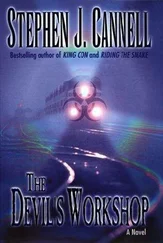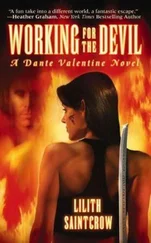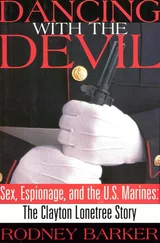Алан Джадд - The Devil's Own Work
Здесь есть возможность читать онлайн «Алан Джадд - The Devil's Own Work» весь текст электронной книги совершенно бесплатно (целиком полную версию без сокращений). В некоторых случаях можно слушать аудио, скачать через торрент в формате fb2 и присутствует краткое содержание. Жанр: sf_mystic, на английском языке. Описание произведения, (предисловие) а так же отзывы посетителей доступны на портале библиотеки ЛибКат.
- Название:The Devil's Own Work
- Автор:
- Жанр:
- Год:неизвестен
- ISBN:нет данных
- Рейтинг книги:3 / 5. Голосов: 1
-
Избранное:Добавить в избранное
- Отзывы:
-
Ваша оценка:
- 60
- 1
- 2
- 3
- 4
- 5
The Devil's Own Work: краткое содержание, описание и аннотация
Предлагаем к чтению аннотацию, описание, краткое содержание или предисловие (зависит от того, что написал сам автор книги «The Devil's Own Work»). Если вы не нашли необходимую информацию о книге — напишите в комментариях, мы постараемся отыскать её.
The Devil's Own Work — читать онлайн бесплатно полную книгу (весь текст) целиком
Ниже представлен текст книги, разбитый по страницам. Система сохранения места последней прочитанной страницы, позволяет с удобством читать онлайн бесплатно книгу «The Devil's Own Work», без необходимости каждый раз заново искать на чём Вы остановились. Поставьте закладку, и сможете в любой момент перейти на страницу, на которой закончили чтение.
Интервал:
Закладка:
I remember little of what we used to discuss. Local politics featured, since Chantal's father was involved and it was a neutral and untaxing subject about which we could be indignant and scornful without being challenged to act. World politics was a more regular subject, as it often is among people for whom the personal is either impoverished or for some reason to be avoided. I have noticed that a preoccupation with current affairs sometimes develops among mentally active people who feel that life is slipping away from them or passing them by. I don't think Edward felt this and I know I didn't at that time but we both nevertheless avoided the personal. I'm not sure why; perhaps Edward's reluctance to talk about himself affected me or perhaps we both avoided that of which we sensed there was no ultimate resolution, dissatisfaction being more a matter of temperament than circumstance. Not that Edward ever had any serious political enthusiasms. He had not the nature of an enthusiast, he did not love to hate and his manner was always sceptical, even where his words were not. More even than before, he gave his opinions in inverted commas, which made it sound as if he did not trust the words he used.
I have clearer memories of the circumstances of our talks than of the subjects. Barbecues on the balcony with the moon on the water, lunches in the garden beneath the shade of the olive trees, sometimes a wood fire in Edward's study and always wine, plenty of wine, and afterwards whisky. He drank a lot but my own increase prevented me from noticing quite how much he was taking. He had continued to smoke cigars ever since that morning we had met at M. Englert's after Tyrrel's death. They might even have been Tyrrel's cigars to start with; whether they were or not, he smoked them with the same careless compulsion, discarding them before the end.
One of the occasions that stands out was an evening on the balcony. The sun had set, leaving a clear but fading light. Eudoxie was gardening — she was a keen gardener and often used to work in the cool of the evening — and Edward had gone inside to get another bottle of whisky. I could hear him moving about downstairs as I sat smoking one of his cigars and watching Eudoxie. She was wearing jeans and a white T-shirt which showed up in the fading light. Her hair was loose and hung over her face as she bent to do something to a plant. She had to keep pushing it back with one hand, which reminded me of the first time I saw her with Tyrrel and brought me to reflect upon how lucky she was to be one of those women who seem ageless. Chantal, of course, had had motherhood to contend with but even without that would have been as obviously in early middle age as I was. Even Catherine, whom I still tended to think of as never being more than twelve, was now more woman than girl. But Eudoxie remained as vital and as elusive as ever.
She straightened and turned to face the house, raising one hand as if to shade her eyes. There was really no need and I think she had probably reached to pat her hair and had simply not lowered her hand. In her other she held a trowel. She was looking at the big window of Edward's study. I could no longer hear him moving but I could hear the sounds of a typewriter. It was neither loud nor particularly rapid but it was regular, as if the typist used only two fingers but was quite practised. Edward had mentioned that he typed now rather than wrote. I thought it odd that he should leave me and work, but who was I to question the ways of great writers? My once passionate belief that art transcended social obligation had settled into a habit of thought every bit as unreflecting as any convention. The sounds could not have lasted very long because I remember I had not finished my cigar when they stopped and Edward reappeared. Eudoxie was bending over the plants again.
I told Edward he shouldn't worry about me but should carry on with his work if he wanted; I was happy with the whisky and the view.
He looked puzzled. 'I could hear you typing,' I added. He stood with the bottle in his hand. 'Just now?'
'When you were downstairs. Eudoxie could, too. At least, she was staring at you in the study.'
He glanced at her, not exactly fearfully but as a sailor might glance at clouds. 'It wasn't me,' he said quietly. 'But you do type your stuff now, don't you?'
'I've been trying it.' He put the bottle on the table and sat heavily in the wicker chair. For a while he sat and stared as if he were alone. His features had sagged of late and his belly bulged over the top of his trousers but he was still a handsome man. When he brooded, as now, it was easy to imagine him as a Henry VIII, unpredictable, capable equally of impulsive generosity or quiet vindictiveness, according to the heaviness within.
'It has taken the place of the writing noise,' he said eventually. 'It wasn't me typing but I was thinking about it. It started when I changed to the typewriter. You are the only person apart from Eudoxie who knows about this.' His blue eyes rested vacantly upon mine.
'Does it help to type? Do you feel you write better?'
'I cannot write at all. Whatever I do comes out nonsense. It doesn't like me leaving the pen.'
'Perhaps you should try a word processor.'
He shook his head, opened the bottle and poured.
I regretted the flippancy of my remark because I very much wanted to know more but I had been puzzled by his words and a little frightened by his manner. It was like being with someone who had identified in himself the symptoms of fatal illness and you wish to jolly him out of it, while suspecting he might be right. I did not then know how completely the writing had taken possession of him and when he spoke of 'it' not wanting him to forsake the pen I feared he was displaying symptoms of a nervous condition. It was also about that time that I began to suspect that he was profoundly lacking in self-awareness. At first I thought this odd in a writer but now I am not so sure; if you study their books as I do you will often see what they do not. The effect of Edward's unselfconsciousness, if I can call it that, was to create the illusion of quiet decisiveness, determination, sureness of purpose. It also suggested an incipient brutality which I think some people found attractive. Yet at the same time it somehow made one feel for him as if he were a child in this world. We might all have felt more for him if we had had any idea of the emptiness, destruction and terror concealed beneath his heavy immobility, his measured tones, and his apparently attentive blue eyes.
He did actually get a word processor though I know he never wrote a book on it. What was taken to be his reluctance to embrace new technology became a part of the mythology and it was sometimes contrasted with the way in which he was always abreast or ahead of literary fashion. No one had any idea then that the word processor represented a desperate attempt to escape his fate; it was regarded as his one concession to modernity. His surroundings, notwithstanding the luxury of the view, remained spartan. He and Eudoxie occupied that house as if they had never properly unpacked and I think that was how he came to view his place in the world. The walls were as bare as his Kennington flat, there was little furniture, no television and no sound system. Presumably there must have been a number of Tyrrel's effects but I never saw any. I gathered that Eudoxie looked after everything connected with the property. How she viewed her place in the world, none can know.
I discovered the word processor by accident. Whether my remark had influenced Edward, I have no idea; he had said nothing about getting one. It was a Saturday and Chantal and I had taken the children for lunch with cousins of hers in Villefranche. Parents with young children are not often welcome — at least, there is usually more genuine pleasure at their departure than their arrival — but these cousins had enough children for two more to make little difference. From their house we could make out Edward's across the bay as two white rectangles, one horizontal and one vertical, with red roofs and windows that caught the sun. The green Cap was dotted with many larger white and red shapes but there was none more famous. Edward had recently removed the name from outside the house because of the number of thesis-hunters who found their way up the steps or along the lane. On that Saturday afternoon we thought we could call on him. I was wary of doing so unannounced but Chantal thought it all right provided we left the children with her cousins.
Читать дальшеИнтервал:
Закладка:
Похожие книги на «The Devil's Own Work»
Представляем Вашему вниманию похожие книги на «The Devil's Own Work» списком для выбора. Мы отобрали схожую по названию и смыслу литературу в надежде предоставить читателям больше вариантов отыскать новые, интересные, ещё непрочитанные произведения.
Обсуждение, отзывы о книге «The Devil's Own Work» и просто собственные мнения читателей. Оставьте ваши комментарии, напишите, что Вы думаете о произведении, его смысле или главных героях. Укажите что конкретно понравилось, а что нет, и почему Вы так считаете.











